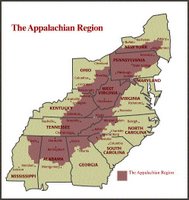The Shakespearean Version of Deliverance?
How many of you come from the Appalachia? I really don’t know if my readership or demographic captures a lot of Appalachian folk, but I thought I’d ask anyway. Really, if any of you do hail from Appalachia feel free to chime in….<sound of crickets chirping>….OK on with the meat of this post. This bit of information came as a bit of a shocker to me when I happened upon it a short while ago. There are very credible, scholarly linguists, who believe that the Appalachian dialect is a result of Elizabethan influences in that geographical area during the 16th Century. During the early development of the United States back when there were a few fledgling colonies, Shakespearean acting troops supposed traveled around in, what is now known as Appalachia. Before we go much further let’s define Appalachia.
“Appalachia, as defined in the legislation from which the Appalachian Regional Commission derives its authority, is a 200,000-square-mile region that follows the spine of the Appalachian Mountains from southern New York to northern Mississippi. It includes all of West Virginia and parts of twelve other states: Alabama, Georgia, Kentucky, Maryland, Mississippi, New York, North Carolina, Ohio, Pennsylvania, South Carolina, Tennessee, and Virginia. About 22 million people live in the 406 counties of the Appalachian Region; 42 percent of the region's population is rural, compared with 20 percent of the national population.”(1)
To make it a little easier to picture I have included a map of the region below:
Basically, the theory says that during the 16th Century in Appalachia there where a multitude of different cultures and dialects in this area. The Appalachian dialect is believed to be an amalgamation of elements from the original Indians, early French trappers, German settlers, and Blacks with whom the Scots-Irish pioneers worked in lumber camps, coal mines, cotton mills, and textile plants. I’ve also found accounts that implicate traveling Shakespearean acting troupes that left members behind in various Appalachian communities during their travels. In any case, the Elizabethan Shakespearean English influence can be recognized in the present day dialect with a little insight and some imagination. When the word “Appalachia” is uttered, most people immediately think of the movie “Deliverance” and the famous line, “Squeal like a pig for me…”. American film and television have been the messengers of a less-than-flattering almost repulsive view of Appalachia and the culture. Displayed by such films as "Deliverance", and such television shows as "The Beverly Hillbillies" and by the comic strip, "Li'l Abner", Appalachian people were viewed as hopeless but proud, desperate but industrious, noble first generation frontier people, yet somehow ignorant, degenerate, and INBRED.
Some examples of the Elizabethan and Scot-Irish elements in Appalachian dialect can be seen in the use of phrases like “a-studying” and “a-working”, which are verbal nouns and go back to Anglo-Saxon times. The word “nigh” is the old word for near, and “weary” was the pronunciation of worry in the 1300's and 1400's. Another common word, “reckon”, comes from Tudor England and means to consider or to suppose.
“Pronunciation of many words has changed considerably, too. Deef for deaf, heered for heard, afeared for afraid, cowcumber for cucumber, bammy for balmy, holp for helped, are a very few. Several distinct characteristics of the language of Elizabeth's day are still preserved. Words that had oi in them were given a long i pronunciation: pizen, jine, bile, pint, and so on. Words with er were frequently pronounced as if the letters were ar: sarvice, sartin, narvous. It is from this time that we get our pronunciation of sergeant and the word varsity which is a clipping of the word university given the ar sound. Another Elizabethan characteristic was the substitution of an i sound for an e sound. You hear this tendency today when people say miny kittle, Chist, git, and so on. It has caused such confusion with the words pen and pin (which our people pronounce alike as pin) that they are regularly accompanied by a qualifying word - stick pin for the pin and pin and ink pin for the pen.” (2)
I think that you get the drift. There is also a lesser know theory that environmental influences such as temperature and vectors (such as infectious mosquitoes) played a part in introducing lethargy and effectively slowing down the meter of the spoken language in the southern regions of Appalachia. Much like playing a 45 rpm record at something like 42 rpm (for our younger readers – there used to be these things called records way before CD’s and MP3’s – yes, really.). Well! There it is ladies and gentlemen, your brief foray into the wonderful and weird world of linguistics. The next time you watch “Deliverance” don’t think about a narvous Ned Beatty getting sodomized whilst hugging a fallen Sugar Maple for dear life, think about how those inbred mountain miscreants in the film have preserved a small token of the Elizabethan linguistic heritage.











2 Comments:
Matt,
Very well written piece and I think you've covered it pretty well.
It amazes me sometimes that the words and expressions we grew up with are not used by other people in the country. I thought everyone refered to their family members as "their people". In the winter, I put a "toboggan" on my head; if someone asked me for a stocking cap I wouldn't know what the hell they were talking about. And I just assumed that "from around these parts" was a common expression of being from the general area.
Not to sound to sensative but I'd like to add a thought to your last paragraph: Please think of us as a diverse group of people. We have different degrees of accent and dialect depending on where you are. It is true that Appalachians could unite around a common culture, but we all differ from individual to individual just like other people of other cultures. A hillbilly trucker with a big beard and Mack Truck hat might be one of the smartest and open-minded people you'd ever meet. The only way to find out is to talk to him and overlook any linguistic differences.
BTW- I lifted your map of Appalachia to use for our blog because it's the only one I could find that fits in our sidebar. If it's a problem let me know and I'll take it down.
Again, great blog and excellent post. Take care.
Thanks for reading and commenting on my blog post about Appalachia. I'm going to revise it slightly for publication on Blogcritcs.org in a few days. I will make sure to add your comments and give appropriate credit.
Post a Comment
<< Home